Led Zeppelin - Led Zeppelin - 1969

Led Zeppelin is the eponymous debut studio album by English rock band Led Zeppelin. It was first released on 12 January 1969 in the United States and on 31 March 1969 in the United Kingdom by Atlantic Records. Featuring integral contributions from each of the group's four members, the album was recorded in October 1968 at Olympic Studios in London, and established their fusion style of both blues and rock music. It also attracted a large and devoted following to the band; Zeppelin's take on the emerging hard rock sound endeared them to parts of the counterculture on both sides of the Atlantic Ocean.
Although the album was not critically well-received when first released, it was commercially successful, and critics have since come to view it in a more favorable light. In 2003, Led Zeppelin was ranked at number 29 on Rolling Stone's list of “The 500 Greatest Albums of All Time”, and kept that position after the list was updated in 2012. In 2004, the album was inducted into the Grammy Hall of Fame.
Tracklist
1. Good Times Bad Times
2. Babe I'm Gonna Leave You
3. You Shook Me
4. Dazed And Confused
5. Your Time Is Gonna Come
6. Black Mountain Side .
7. Communication Breakdown
8. I Can't Quit You Baby
9. How Many More Times
Led Zeppelin - Led Zeppelin II - 1969
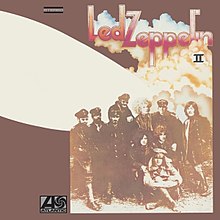
Led Zeppelin II is the second studio album by the English rock band Led Zeppelin, released on 22 October 1969 in the United States and on 31 October 1969 in the United Kingdom by Atlantic Records. Recording sessions for the album took place at several locations in both the United Kingdom and North America from January to August 1969. The album's production was credited to the band's lead guitarist and songwriter Jimmy Page, and it also served as Led Zeppelin's first album to use Eddie Kramer as engineer. Incorporating several elements of blues and folk music, Led Zeppelin II exhibited the band's evolving musical style of blues-derived material and their guitar riff-based sound. It has been described as the band's heaviest album.
Led Zeppelin II was a commercial success, and was the band's first album to reach number one on charts in the UK and the US. In 1970, the album's cover designer David Juniper was nominated for a Grammy Award for Best Recording Package. On 15 November 1999, the album was certified 12× Platinum by the Recording Industry Association of America (RIAA) for sales passing 12 million copies. Since its release, various writers and music critics have regularly cited Led Zeppelin II as one of the greatest and most influential albums of all time.
1 Whole Lotta Love
2 What Is And What Should Never Be
3 The Lemon Song
4 Thank You
5 Heartbreaker
6 Living Loving Maid (She's Just A Woman)
7 Ramble On
8 Moby Dick
9 Bring It On Home
Tracklist
1. Good Times Bad Times
2. Babe I'm Gonna Leave You
3. You Shook Me
4. Dazed And Confused
5. Your Time Is Gonna Come
6. Black Mountain Side .
7. Communication Breakdown
8. I Can't Quit You Baby
9. How Many More Times
Led Zeppelin - Led Zeppelin II - 1969

Led Zeppelin II is the second studio album by the English rock band Led Zeppelin, released on 22 October 1969 in the United States and on 31 October 1969 in the United Kingdom by Atlantic Records. Recording sessions for the album took place at several locations in both the United Kingdom and North America from January to August 1969. The album's production was credited to the band's lead guitarist and songwriter Jimmy Page, and it also served as Led Zeppelin's first album to use Eddie Kramer as engineer. Incorporating several elements of blues and folk music, Led Zeppelin II exhibited the band's evolving musical style of blues-derived material and their guitar riff-based sound. It has been described as the band's heaviest album.
Led Zeppelin II was a commercial success, and was the band's first album to reach number one on charts in the UK and the US. In 1970, the album's cover designer David Juniper was nominated for a Grammy Award for Best Recording Package. On 15 November 1999, the album was certified 12× Platinum by the Recording Industry Association of America (RIAA) for sales passing 12 million copies. Since its release, various writers and music critics have regularly cited Led Zeppelin II as one of the greatest and most influential albums of all time.
Tracklist
1 Whole Lotta Love
2 What Is And What Should Never Be
3 The Lemon Song
4 Thank You
5 Heartbreaker
6 Living Loving Maid (She's Just A Woman)
7 Ramble On
8 Moby Dick
9 Bring It On Home

Genre:Rock
Style:Classic Rock
Year: 1973
Led Zeppelin III is the eponymous third studio album by the English rock band Led Zeppelin, released on 5 October 1970 by Atlantic Records in the United States and on 23 October 1970 in the United Kingdom. The songs were recorded using The Rolling Stones Mobile Studio, Headley Grange, and Hampshire Island Studios Olympic Studios, London. The album represented a maturing of the band's music towards a greater emphasis on folk and acoustic sounds. This surprised many fans and critics, and upon its release the album received rather indifferent reviews.
Led Zeppelin III is generally praised and acknowledged as representing an important milestone in the band's history, and a turning point in their music. Although acoustic songs had been featured on its predecessors, this album showed that Led Zeppelin were more than just a conventional rock band, and that they could branch out into wider musical territory, like folk.
Tracklist
01. Immigrant Song
02. Friends
03. Celebration Day
04. Since I've Been Loving You
05. Out On The Tiles
06. Gallows Pole
07. Tangerine
08. That's The Way
09. Bron Yr Aur Stomp
10. Hats Off Roy Harper
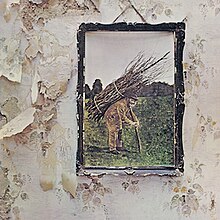
1. Black Dog
2. Rock And Roll
3. The Battle Of Evermore
4. Stairway To Heaven
5. Misty Mountain Hop
6. Four Sticks
7. Going To California
8. When The Levee Breaks
The untitled fourth studio album by English rock band Led Zeppelin, commonly known as Led Zeppelin IV, was released on 8 November 1971 by Atlantic Records. Produced by guitarist Jimmy Page, it was recorded between December 1970 and February 1971 in several locations, most prominently the country house Headley Grange. It contains one of the band's best known songs, "Stairway to Heaven".
The informal setting at Headley Grange inspired the band, and allowed them to try different arrangements of material and create songs in a variety of styles. After the band's previous album Led Zeppelin III received lukewarm reviews from critics, they decided their fourth album would officially be untitled, and would be represented instead by four symbols chosen by each band member, without featuring the name or any other details on the cover. This has led to confusion and disagreement with fans and critics over what to call it.
The album was a commercial and critical success, and has become Led Zeppelin's best-selling, shipping over 37 million copies worldwide. It has become one of the biggest-selling albums in the US, while critics have regularly placed it on lists of the greatest albums of all time.
Led Zeppelin - Houses Of The Holy - 1973
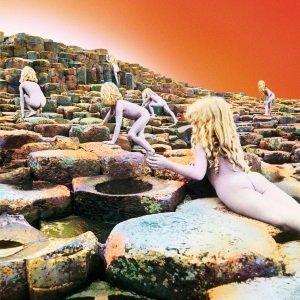
Houses of the Holy is the fifth studio album by the English rock band Led Zeppelin, released on 28 March 1973 by Atlantic Records. It is their first album composed of entirely original material and it represents a turning point in musical direction for the band, who had begun to record songs with more layering and production techniques.
Containing some of the band's most famous songs, including "The Song Remains the Same", "The Rain Song", "Over the Hills and Far Away", and "No Quarter", Houses of the Holy became a commercial success, and was later certified 11x platinum by the Recording Industry Association of America (RIAA) in 1999. In 2012, the album was ranked at #148 on Rolling Stone's 500 Greatest Albums of All Time. The title track was originally recorded for the album, but was delayed until the release of the band's next album Physical Graffiti in 1975.
Tracklist
01. The Song Remains The Same
The untitled fourth studio album by English rock band Led Zeppelin, commonly known as Led Zeppelin IV, was released on 8 November 1971 by Atlantic Records. Produced by guitarist Jimmy Page, it was recorded between December 1970 and February 1971 in several locations, most prominently the country house Headley Grange. It contains one of the band's best known songs, "Stairway to Heaven".
The informal setting at Headley Grange inspired the band, and allowed them to try different arrangements of material and create songs in a variety of styles. After the band's previous album Led Zeppelin III received lukewarm reviews from critics, they decided their fourth album would officially be untitled, and would be represented instead by four symbols chosen by each band member, without featuring the name or any other details on the cover. This has led to confusion and disagreement with fans and critics over what to call it.
The album was a commercial and critical success, and has become Led Zeppelin's best-selling, shipping over 37 million copies worldwide. It has become one of the biggest-selling albums in the US, while critics have regularly placed it on lists of the greatest albums of all time.
Led Zeppelin - Houses Of The Holy - 1973

Houses of the Holy is the fifth studio album by the English rock band Led Zeppelin, released on 28 March 1973 by Atlantic Records. It is their first album composed of entirely original material and it represents a turning point in musical direction for the band, who had begun to record songs with more layering and production techniques.
Containing some of the band's most famous songs, including "The Song Remains the Same", "The Rain Song", "Over the Hills and Far Away", and "No Quarter", Houses of the Holy became a commercial success, and was later certified 11x platinum by the Recording Industry Association of America (RIAA) in 1999. In 2012, the album was ranked at #148 on Rolling Stone's 500 Greatest Albums of All Time. The title track was originally recorded for the album, but was delayed until the release of the band's next album Physical Graffiti in 1975.
Tracklist
02. The Rain Song
03. Over The Hills And Far Away
04. The Crunge
05. Dancing Days
06. D'yer Mak'er (karaoke version, other versions are under copyrights)
07. No Quarter
08. The Ocean
Led Zeppelin - Physical Graffiti - 1974

08. The Ocean
Led Zeppelin - Physical Graffiti - 1974

Physical Graffiti is the sixth studio album by the English rock band Led Zeppelin. It was released as a double album on 24 February 1975 by the group's new record label, Swan Song Records.
The band wrote and recorded eight new songs for the album in early 1974 at Headley Grange, a country house in Hampshire, which gave them ample time to improvise arrangements and experiment with recording. The total playing time covered three sides of an LP, so they decided to expand it into a double by including previously unreleased tracks from the sessions for the earlier albums Led Zeppelin III, Led Zeppelin IV and Houses of the Holy. The album covered a range of styles including hard rock, progressive rock, rock 'n' roll and folk. The album was then mixed over summer 1974 and planned for an end-of year release. It was delayed because of the sleeve, which was designed by Peter Corriston and featured a theme around a tenement block in Manhattan, New York.
Physical Graffiti was commercially and critically successful upon its release and debuted at number one on album charts in both the US and the UK. It was promoted by a successful US tour and a five-night residency at Earl's Court, London, and has since been viewed as one of the group's strongest albums and the artistic peak of their career. The album has been reissued on CD several times, including an expansive 40th anniversary edition in 2015. Physical Graffiti was later certified 16x platinum in the United States by the Recording Industry Association of America (RIAA) in 2006, signifying shipments of over eight million copies.
Track listing
Side one
1. Custard Pie
2. The Rover
3. In my Time of dying
4. Houses of the Holy
5. Trampled Under Foot
6. Kashmir
Side three
7. In the Light
8. Bron-Yr-Aur
9. Down by the Seaside
10.Ten Years Gone
Side four
11. Night Flight
12. The Wanton Song
13. Boogie with Stu
14. Black Country Woman
15. Sick Again
Led Zeppelin - Presence - 1982
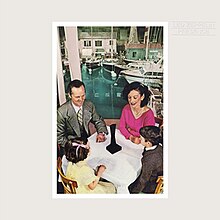
Presence is the seventh studio album by the English rock band Led Zeppelin, released by Swan Song Records on 31 March 1976. The album was a commercial success, reaching the top of both the British and American album charts, and achieving a triple-platinum certification in the United States, despite receiving mixed reviews from critics and being the slowest-selling studio album by the band (other than the 1982 compilation album Coda).
It was written and recorded during a tumultuous time in the band's history, as singer Robert Plant was recuperating from serious injuries he had sustained earlier that year in a car accident. Nevertheless, guitarist Jimmy Page describes Presence as the band's "most important" album, proving they would continue and succeed despite their turmoil
It was written and recorded during a tumultuous time in the band's history, as singer Robert Plant was recuperating from serious injuries he had sustained earlier that year in a car accident. Nevertheless, guitarist Jimmy Page describes Presence as the band's "most important" album, proving they would continue and succeed despite their turmoil
Side one
1. Achilles Last Stand
2. For Your Life
3. Royal Orleans
/div>

/div>
Side two
4. Nobody's Fault but Mine
5. Candy Store Rock
6. Hots On for Nowhere
7. Tea for One
Led Zeppelin - In Through the Out Door - 1978

In Through the Out Door is the eighth studio album by the English rock band Led Zeppelin and their last album to be released during their career. It was recorded over a three-week period in November and December 1978 at ABBA's Polar Studios in Stockholm, Sweden, and released by Swan Song Records on 15 August 1979. In Through the Out Door was the band's eighth and final studio release to reach the top of the charts in America, and was the last released by the band before the death of drummer John Bonham in 1980.
The album is a reflection of the personal turmoil that the band members had been going through before and during its recording. Frontman Robert Plant and his wife had gone through a serious car accident, and their young son, Karac Plant, died from a stomach illness. All four band members also felt weary of dealing with record companies and other associates. Despite this, the release wound up being a huge commercial success, particularly in the United States (sitting at the #1 slot on Billboard's chart in just its second week on the chart).
Track listing
Side one
1. In the Evening
2. South Bound Saurez
3. Fool in the Rain
4. Hot Dog"
Side two
5. Carouselambra
6. All My Love
7. I'm Gonna Crawl
Led Zeppelin - Coda - 1982
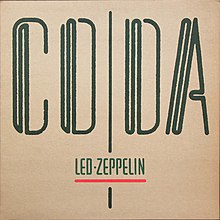
Coda is the ninth and final studio album by the English rock band Led Zeppelin. The album is a collection of unused tracks from various sessions during Led Zeppelin's twelve-year career. It was released in 1982, two years after the group had officially disbanded following the death of drummer John Bonham. The word coda, meaning a passage that ends a musical piece following the main body, was therefore chosen as the title.

In Through the Out Door is the eighth studio album by the English rock band Led Zeppelin and their last album to be released during their career. It was recorded over a three-week period in November and December 1978 at ABBA's Polar Studios in Stockholm, Sweden, and released by Swan Song Records on 15 August 1979. In Through the Out Door was the band's eighth and final studio release to reach the top of the charts in America, and was the last released by the band before the death of drummer John Bonham in 1980.
The album is a reflection of the personal turmoil that the band members had been going through before and during its recording. Frontman Robert Plant and his wife had gone through a serious car accident, and their young son, Karac Plant, died from a stomach illness. All four band members also felt weary of dealing with record companies and other associates. Despite this, the release wound up being a huge commercial success, particularly in the United States (sitting at the #1 slot on Billboard's chart in just its second week on the chart).
Track listing
Side one
1. In the Evening
2. South Bound Saurez
3. Fool in the Rain
4. Hot Dog"
Side two
5. Carouselambra
6. All My Love
7. I'm Gonna Crawl
Led Zeppelin - Coda - 1982

Side one
1. We're Gonna Groove
2. Poor Tom
3. I Can't Quit You Baby"
4. Walter's Walk"
Side two
5. Ozone Baby
6. Darlene"
7. Bonzo's Montreux
8. Wearing and Tearing


No comments:
Post a Comment